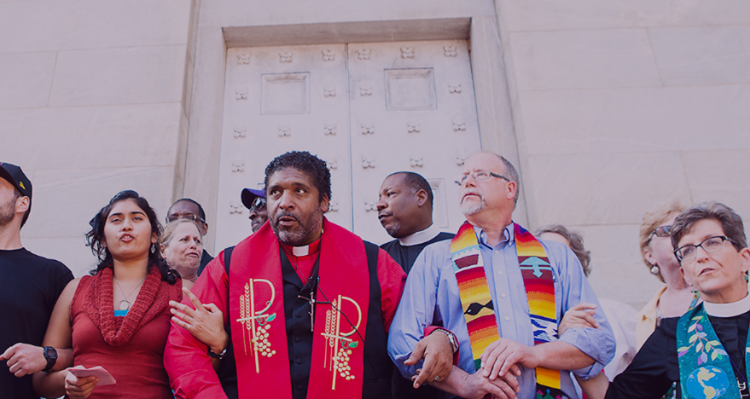In a recent Rose Garden ceremony made for television, President Trump welcomed religious leaders who blessed his campaign to celebrate “religious liberty.” With a flurry of prayer and contemporary Christian worship music, Trump signed an executive order instructing the IRS to exercise maximum discretion in enforcing the Johnson Amendment, which prohibits tax-exempt churches from functioning as political action committees. This administration, the president signaled, wants to hear from the aggrieved white Christians who suffered eight long years under a black man they imagined to be Muslim, progressive, and un-American.
But these are not the only religious voices the president must hear.
Because he worries about the racial optics of his “Amen” corner, Trump lifted up to the Rev. Martin Luther King, Jr. in his remarks, not the Rev. Jerry Fallwell, who rallied a Religious Right in the 1970s to undermine the anti-racist policies Dr. King had championed. For the overwhelmingly white congregation gathered to bless their dream president, this is proof enough that he is, in his own words, the “least racist person ever.” But for anyone attentive to the black church tradition in America, this PR stunt exposes how reactionary religion aims to sanctify an assault on the policy agenda of America’s first black president.
The racist roots of reactionary religion are spelled out in the names of some of American Christianity’s most prominent institutions. The Southern Baptist Convention—America’s largest Protestant denomination—is Southern precisely because we separated from other American Baptists before the Civil War in order to keep our slaves. I was baptized and called to preach in the Southern Baptist Church. We learned to read the Bible in ways that justified white superiority long after slavery was no longer expedient.
In 1905, after Jim Crow had been instituted throughout the South, the Southern Baptist Biblical Recorder celebrated how the Klan had “disarmed the black cohorts, struck down their white satraps, and drove from the Temple of our Liberties the horde that had been put into possession of the holy of holies itself.”
When Southern fundamentalists thundered against the “immorality” of Dr. King and the civil rights movement half a century later, they lent religious authority to white supremacy, even as they condemned the Klan. Violence, in their view, was regrettable. But federal intervention in our Southern way of life—that was an unconscionable assault on the moral fabric of society, deserving condemnation from God Almighty. Sheriff Jim Clark of Selma, Alabama, echoed the sentiment of countless sermons when he titled his memoir of resisting voting rights in Dallas County The Raping of Selma.
The Barack Obama coalition was not the first political movement in America’s history to incur the wrath of religious rage, but it certainly felt its fury. When Franklin Graham of the Billy Graham Evangelistic Association condemned progressives as “atheists” on his Decision America tour in 2016, he tapped an old anxiety in the souls of white evangelicals. 81 percent of them cast their ballot for Donald Trump, ignoring his obvious hypocrisy to stand against something they imagined to be far worse: a political agenda that does not defend their “values.” These values, as it turns out, are not the values of fellow Christians across race and class lines, but the values of white people who are anxious about their loss of cultural power.
RELATED READING: The Power & Privilege of White Women
As Frances FitzGerald chronicles in her recent history, The Evangelicals, religious conservatives in the Obama era splintered considerably on “values” issues, demonstrating institutional support for many social justice issues. Going into 2016, many in Washington thought the Religious Right was dead. But white evangelicals proved to be a reliable base for Trump’s anti-Obama campaign. Reactionary religious rage handed Trump the White House. A party in the Rose Garden for some of its most ardent firebrands was the least Trump could do.
But Trump’s attempt to cover the blatant racism of his National Day of Prayer spectacle inadvertently pointed toward the one tradition that might save us from self-destruction. “America has a rich tradition of social change beginning in our pews and in our pulpits,” Trump said in his remarks, “Perhaps there is no greater example than the historic role of the African-American church.”
Every con depends on a kernel of truth. Alongside the religious rage that brought Trump to power, there is indeed a long black-led freedom movement that has spoken prophetically against the institutional racism and brazen hypocrisy of a nation built on the original sin of race-based slavery.
No one embodies that tradition more powerfully than the Rev. Dr. William J. Barber, II, whom Esquire recently dubbed “Reverend Resistance.” Looking beyond partisan efforts to simply impeach Trump or shift Congressional seats to Democrats in 2018, Rev. Barber announced this past week that he is transitioning from his role as president of the North Carolina NAACP to join other moral leaders across the U.S. in a Poor People’s Campaign.
ALSO FROM REV. DR. BARBER: A Prayer to ‘Save Us From the Unmerciful and Un-American Health Care Act’
Appealing as much to the plurality of the electorate that didn’t vote in 2016 as to the majority of voters who chose someone other than Trump, this campaign aims to fulfill Dr. King’s vision of a national coalition that makes clear how institutional racism continues to keep black, white, and brown people in poverty. Such a moral movement would necessarily shift the priorities of both major parties in what Dr. King called a “moral revolution of values.” It’s hardly the sort of public religion the president intended, but one of the ironies of history may be that Trump’s deconstruction agenda will help mobilize a coalition that can bring about such fundamental change.
The possibility alone is enough to inspire a very different National Day of Prayer.

